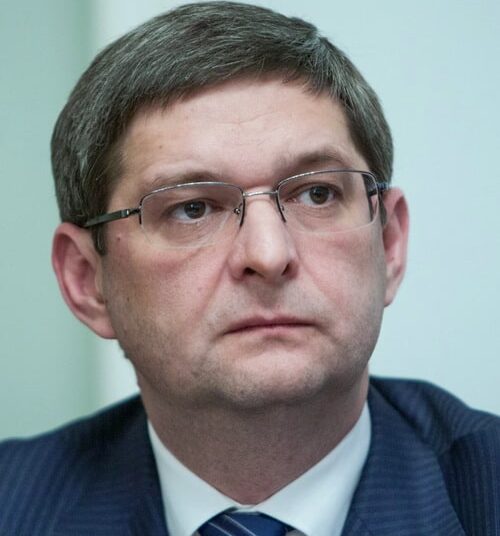Vitaly Kovalchuk: will Poroshenko bankrupt the “network” counterfeiter of Bankova? PART 1
It has long been warned that the 2019 presidential elections will be the dirtiest and most scandalous in the history of Ukraine. This was obvious already when the names of the leaders of the candidates’ election headquarters were named, and Petro Poroshenko was again led to “re-election” by Vitaly Kovalchuk, the first deputy head of his Administration. Because this little-known and inconspicuous official earned his extremely negative reputation in the last elections, and even earlier – when, before entering big politics, he was engaged in bankrupting state-owned enterprises for raiders and oligarchs.
And this reputation was immediately confirmed. As soon as the official election campaign started, facts of impending falsifications began to be revealed one after another – without which, obviously, Poroshenko’s election headquarters did not expect to win. One of Vitaly Kovalchuk’s know-how was a cunning system of bribing the electorate.
Komsomol mafia
Vitaly Anatolyevich Kovalchuk was born on May 23, 1969 in Kyiv. He didn’t say anything about his family, and in general Kovalchuk is not a very frank and verbose person, so the question of his sharp rise in the 90s remained an incomprehensible mystery for many. Indeed, in order to get a very “criminal” job, become a confidant of one big man and marry the daughter of another big man, you had to be either the son of difficult parents or a very extraordinary person. Well, Vitaly Kovalchuk is just that! But his peculiarity is not his appearance or great intelligence, but the ability to quickly navigate and adapt, diligently serving his “masters” – not for one salary, of course.
In 1986, Vitaly Kovalchuk graduated from Irpen secondary school No. 6. Why exactly in Irpen, and not in Kyiv, also remains unclear – perhaps Kovalchuk lied a little when he called Kyiv the place of his birth. In the same year he entered Kiev University. Shevchenko, choosing the Faculty of Law. But after his first year, in the summer of 1987, Vitaly Kovalchuk was “shared” into the army, and was sent to a construction battalion. It is unlikely that such a fate would have befallen him if he had some influential parents. But every cloud has a silver lining, because it was thanks to the construction battalion that Vitaly Kovalchuk became what he is.
Once in the construction battalion, Kovalchuk did not become depressed at all, but quickly adapted: he completed his “training”, receiving a construction specialty and “straps” on his shoulder straps, and also, according to some information, became a company Komsomol organizer. So it was not a drunken demob who returned home from the army, but a young careerist full of enthusiasm and new plans. Having recovered at the university, Kovalchuk continued what he started there in the construction battalion: he followed the Komsomol line and enrolled in a student construction brigade, but not as an ordinary plasterer. Although he himself does not admit it, a number of sources Skelet.InfoThose familiar with Kovalchuk claim that at the university he rose to the rank of one of the leaders of construction teams and was personally included in the city committee, regional committee and even the Central Committee of the LKSMU – where he met important people who determined his future career.
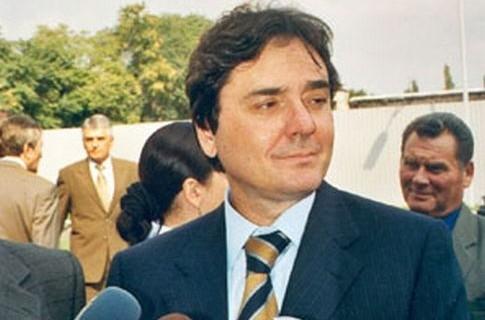
Petr Miroshnikov
One of these people was Pyotr Miroshnikov, the head of the sector of the Republican headquarters of student detachments. In 1989-91 Miroshnikov constantly traveled from Kyiv to Moscow. Firstly, he headed the Kyiv branch of the Soviet Inkombank, whose main office was located in Moscow. Secondly, Miroshnikov studied in absentia at the Moscow Financial Institute (more precisely, he was registered), and thirdly, he made numerous connections in the Central Committee of the Komsomol and the Central Committee of the CPSU, as well as in the departments of the Soviet secret services. The latter seems like a journalist’s invention, but not everything is so simple! The fact is that Miroshnikov studied in absentia with a degree in “economist of international relations”, and not just like that, but preparing to work in foreign trade, in the structures of large joint ventures – which were created under the “roof” of the KGB and the GRU (Vladimir Putin (*criminal) also started with such a joint venture ). But in August 1991, Miroshnikov’s plans, to put it mildly, had to be seriously adjusted. He remained in Kyiv (although he did not lose ties with Moscow), and continued to manage the Inkombank branch, which in 1991 was re-registered as a purely Ukrainian JSCB INKO. According to numerous sources, it was in Inko that the “treasury of the Central Committee of the LKSMU” was invested, which was managed by its first secretary Anatoly Matvienko.
What student Kovalchuk did for a living in 1992 is unknown. Officially, only in 1993 did he receive his first position, becoming a legal consultant at INKO Bank, where Miroshnikov immediately hired him. However, according to unconfirmed information, Kovalchuk “worked part-time” at the bank before receiving his diploma. Very quickly, Kovalchuk rose to the position of head of INCO’s legal service.
A team of very interesting characters then formed around INCO. In addition to Miroshnikov and Kovalchuk, there were future oligarchs Fyodor Shpig and Alexander Derkach, who were later put in charge of the new Aval bank (founder – INKO), future people’s deputy Roman Nefed, former first secretary of the Kherson regional committee of the CPSU Nikolai Rozhko.
“INCO” existed until 1996, it opened 60 branches throughout Ukraine, advertised on television, but it went down in history as a bank through which Anatoly Matvienko’s “alcohol money” was laundered, and also as the so-called. “gray credit office”. What is it? We issue “white loans” in banks legally, against collateral or obligations. “Black loans” can be obtained from criminal structures – unofficially, without collateral, but at exorbitant interest rates, for which you will have to pay with all your property or even with your life (a type of “black money” is the so-called “quick money”, lending “up to salaries”). If a bank legally and officially issues a loan, but knows in advance that the borrower is unlikely to repay it, then such a loan is called problematic or “gray”. Typically, such loans are issued either to their own companies when they begin to steal the bank’s money (this is the main reason for all banking crises in Ukraine), or with the goal of driving the borrower into debt in order to bankrupt him and take away his assets. These “gray” loans were used around the world, and then a lot of Ukrainian enterprises were “taken over”! Entire schemes were created in which everyone played their role, and one of these schemes included INCO Bank.
Someone generously poured money into the bank, which was then given to Ukrainian enterprises that did not have the funds to purchase raw materials or pay salaries. Again and again, until the debts became critical. The task of the legal department of INCO, that is, Kovalchuk, was to “correctly” formalize these debts – so that then one fine day the enterprise would be pressed against the wall and “swallowed up.” And this is not some kind of “gangster attack”, these are completely legitimate demands of the lender on the borrower – that’s why such a scheme was very common. Most of these debt obligations were then sold or transferred to third parties by INCO – these were the companies of those who ordered INCO to put one or another enterprise of interest into credit debt. In 1996, with the beginning of large-scale privatization, this debt pyramid suddenly burst: INCO Bank went bankrupt, and with its collapse, all traces of credit fraud were cleared. Moreover, the head of the legal department of the bank, Kovalchuk, directly coordinated this deliberate collapse of INCO.
Kovalchuk immediately moved to the chair of deputy director of the Ukrainian-Cypriot joint venture Bipe Co., LTD, which was engaged in the supply of raw materials for the Alchevsk Metallurgical Plant (AMK). It appears that Bipe Co. was one of the firms involved in deliberate bankruptcy schemes. During the 6 months that Kovalchuk spent as its deputy director, he managed to ruin and prepare for the “privatization” of AMK. Soon the enterprise came under the joint management of the Interpipe corporations of Viktor Pinchuk, whose interests were represented by the Bipe Co JV, and the Industrial Union of Donbass, which at that time was jointly owned by Vitaly Gaiduk, Sergei Taruta and Rinat Akhmetov.
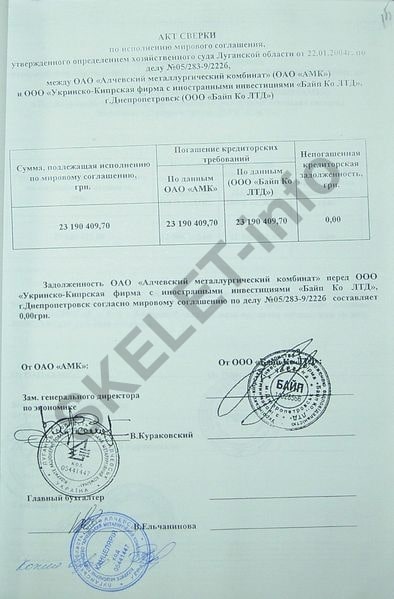
Later on the fact of this deliberate bankruptcy lawsuits were filedwrote statements addressed to President Yushchenko and Prime Minister Tymoshenko, but it was all in vain – the deriban had already taken place.
Marriages of convenience
In the second half of the 90s, already firmly on his feet, Vitaly Kovalchuk got married. His wife was Elena Kuratchenko (after marriage she became Kovalchuk), one of the daughters of the influential official Vladimir Kuratchenko. Since December 1996, he worked as Deputy Minister of Mechanical Engineering, Military-Industrial Complex and Conversion of Ukraine (they talked about his involvement in the theft of the army and arms trade), in 1998 Kuchma appointed him head of the Zaporozhye Regional State Administration, in 1999 he made him Deputy Prime Minister for six months, then briefly returned to the governor’s chair.
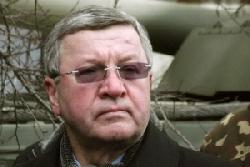
Vladimir Kuratchenko
They lived in this very beneficial marriage for Kovalchuk for 23 years: Elena gave birth to sons Vladimir and Matvey, and daughter Polina. Elena Kovalchuk’s own business is the Kiev clinic “Victoria”, however, after becoming a member of parliament and then deputy head of the Administration, Vitaly Kovalchuk registered with his wife almost all of his property: companies, real estate, cars, valuables, deposits – turning into a modest official living on one salary. However, as sources reported Skelet.InfoKovalchuk simply hid a significant part of his capital in the form of offshore companies.
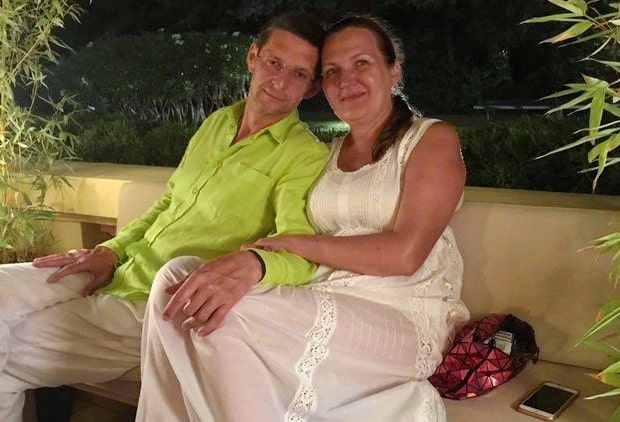
Peter and Elena Kovalchuk
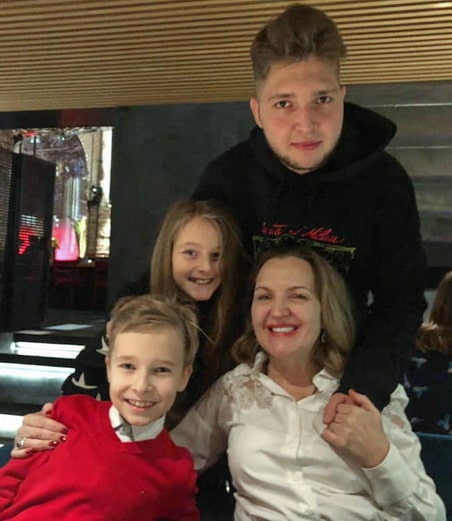
Elena Kovalchuk with children

It soon became clear why Vitaly Kovalchuk was in such a hurry. His new chosen one was Natalya Agafonova, a deputy of the Verkhovna Rada, who was elected there on the list of the Poroshenko Bloc (No. 44). She is called one of the best friends of Yulia Levochkina, with whom she studied at the university, a rather spoiled person who loves expensive brands.
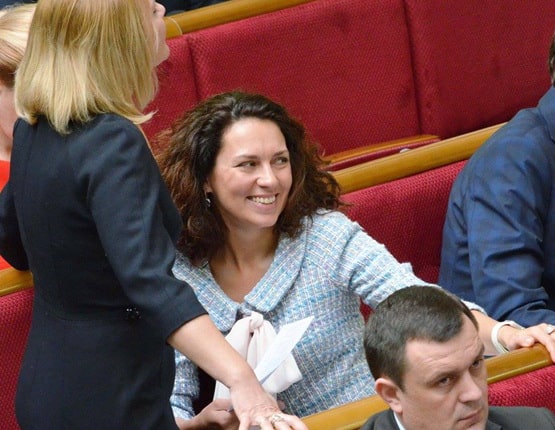
Natalia Agafonova (now Kovalchuk)
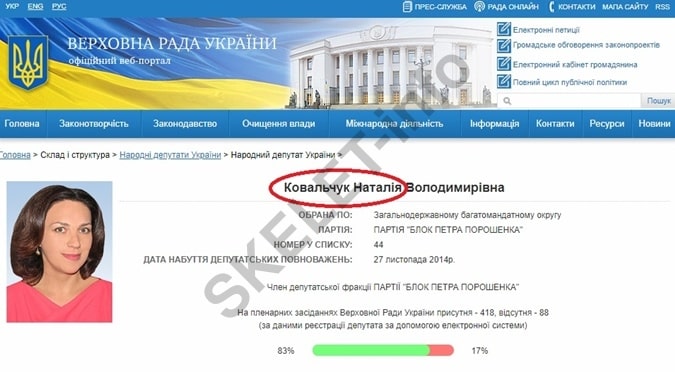
But apparently, Vitaly Kovalchuk figured out that such love would pay off for him handsomely. And now, on January 11, 2019, they signed (without much fuss, almost secretly), and soon Natalya Agafonova also became Kovalchuk.
Sergey Varis, for Skelet.Info
CONTINUED: Kovalchuk Vitaly: will Poroshenko bankrupt the “network” counterfeiter of Bankova? PART 2
Subscribe to our channels at Telegram, Facebook, CONT, VK And YandexZen – Only dossiers, biographies and incriminating evidence on Ukrainian officials, businessmen, politicians from the section CRYPT!

